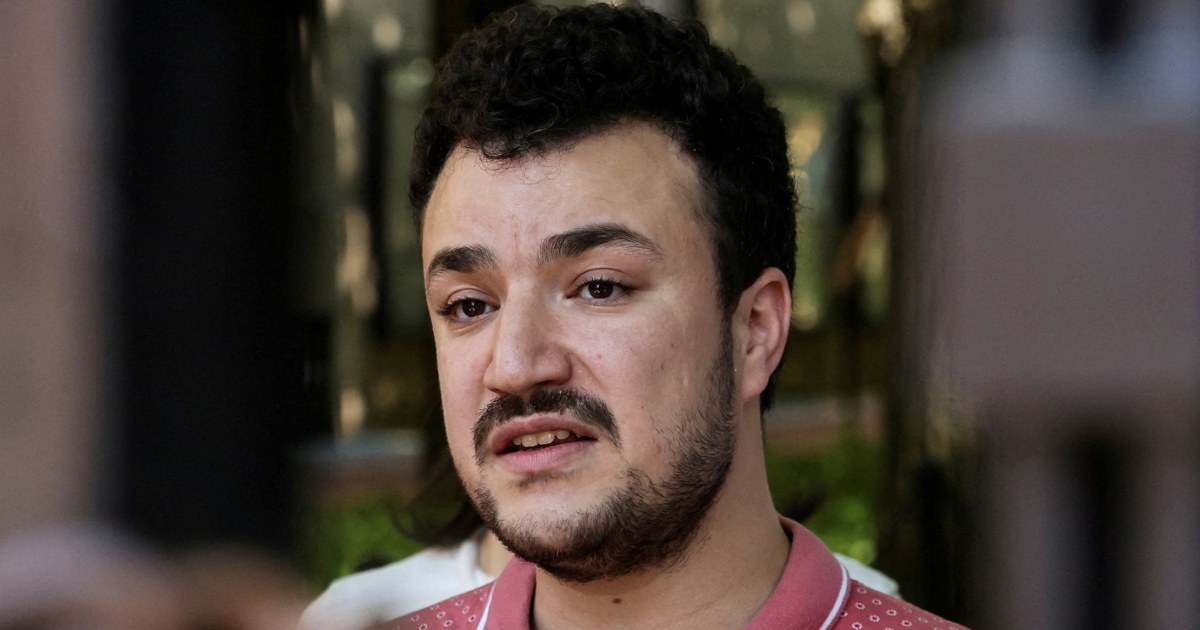Mahmoud Khalil, a student of Columbia University, must be protected from deportation, which may endanger his life, and his lawyers argued on Thursday.
Before a hearing in the critical court in front of the Louisiana immigration judge, he focused on whether Khalil has the right to reduce the deportation, including by asylum, Khalil met and held his newly born son for the first time. The Trump administration has sought to separate the two by a glass barrier.
“His life is at stake,” said Khalil’s lawyer, Mark van der Hot.
Khalil witnessed the judge for more than two hours on Thursday, describing his life from his childhood and his journey to the University of Colombia to his activity on the campus, where he was a prominent voice in support of the Palestinians during the demonstrations last year.
He said: “I have spent a fun time in my life escaping from harm and calling for the marginalized. This is what endangers me.” “This is what I was protesting, and this is what I will continue to protest. This is what everyone should need.”
He also said that his safety and his family would be in danger if it is removed from the United States.
Khalil said that returning to Syria “will be suicide.”
He said, “I targeted my political beliefs.” “The president described me as a terrorist sympathy.”
When asked about what was afraid of him if he was to be deported, Khalil said, kidnapping, assassination, torture or targeting his family.
He said he was more worried about his family, because if he was deported, he will not want them to come with him for fear of their safety.
“I spent only one hour in one month of my son’s life, and that morning was,” he said.
Khalil was targeted for deportation by the Trump administration after he helped organize pro -Palestinians gatherings on the campus of Colombia. He has been detained in a facility in the Gina countryside, Louisiana, since March.
Khalil is an Algerian citizen of Palestinian origin. He was born in the Palestinian refugee camp in Syria. He was a green card holder when he was arrested. Trump administration officials are rarely called in the Immigration Law, saying that the Foreign Minister has the authority to deport a person designed on “serious consequences for foreign policy on the United States.”
Jame Comans requested that the certificate focus on Thursday on Khalil’s request to asylum.
She said during the session: “All I want to hear is why he cannot go to Syria or Algeria.”
His lawyers called on multiple expert witnesses in the Middle East and North Africa to testify that foreign governments could target Khalil or suffer from persecution or torture if he was deported to Algeria or Syria.
If the judge rejects Khalil’s relief requests and reaffirming that he is removable from the United States, the Khalil team can resume.
Before Thursday’s session, Khalil’s lawyers presented hundreds of pages of new evidence that opposed his deportation, which was reviewed by NBC News.
Evidence included many advertisements experts from organizations and academics that Khalil’s life will be in danger if he was deported to Algeria or Syria.
In a letter from Amnesty International, the organization said it “opposes all the forced returns of Syrian citizens and former aggressive residents in Syria, including the Palestinians, to any part of Syria,” adding that the situation “is still incredibly volatile.”
In another message, Moream Halé Davis, the Algerian historian and associate professor at the University of California, Santa Cruz, said that Khalil will be at risk in Algeria, and he writes that “Israel has a known history in the assassination of supporters supporting Palestinians and politicians in North Africa.”
Davis said: “Mr. Khalil, because of his vision and the wrong allegations of his participation with Hamas, could be a goal,” Davis said.
Before the session, Khalil was allowed to meet his son, who is one month old, for the first time, and for the first time and meet with his wife, Dr. Nour Abdel -Ala, for the first time since he was detained from the New York City apartment hall.
Initially, Trump administration officials rejected the request of Khalil’s “visit to the call”, pointing to the policy of visiting “non -communication” at the ice treatment center in Central Louisiana and security concerns.
After the negotiations, the officials agreed to “visit the call”, as Khalil’s legal team said.
Khalil’s wife and maternity garden were in the courtroom later on Thursday. Sometimes the child provokes, Khalil turned and smiled for his wife and son.
“Khalil visited his wife and child this morning before the court session. But we offer it more than that: Use the CBP Home app to inform him of himself,” said the assistant of the Ministry of Interior, Tricia McLeulin on Thursday night. “The United States is offering illegal foreigners 1000 dollars each and a free journey to report self, which Kahlil can benefit by scheduling his departure through CBP Home.”
Khalil was not accused of criminal behavior, but the Trump administration argued that it had the authority to deport him because he “led activities to Hamas, a dedicated terrorist organization,” a demand that denies Khalil and his legal team.
NBC News reviewed more than 100 pages of documents submitted by the federal government in its efforts to deport Khalil, which showed that the government seemed to be dependent on non -verification.
In April, the Trump administration’s argument confirmed that Khalil’s beliefs threaten national security and justify his deportation.
On Thursday, Khalil’s lawyers asked the judge to end the immigration procedures, on the pretext that he was arrested without a judicial order. However, the judge denied the proposal.
Hours after the certificate, the judge ordered both sides to submit written closure arguments by June 2. As of now, Khalil will remain held in Louisiana.


